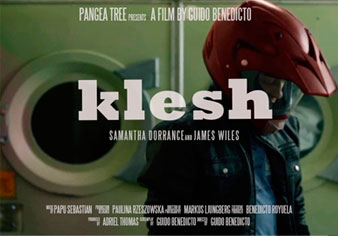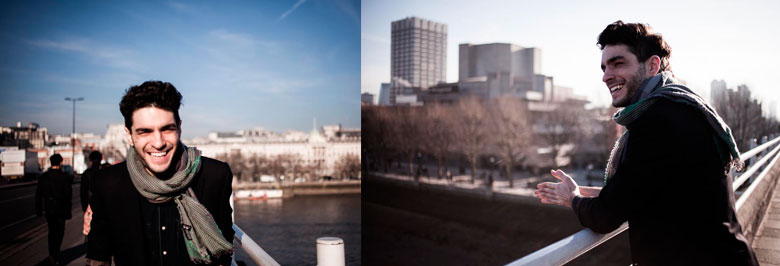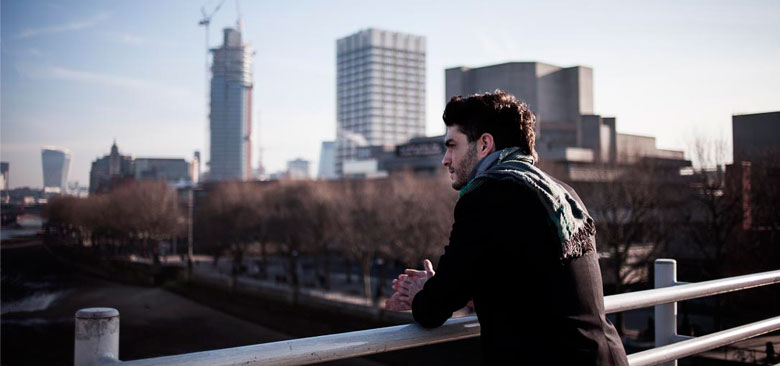Guido Benedicto’s (Brussels, 1983) story shares many elements with so many other up-and-coming creative figures, who come to the British capital in search of the opportunity that will put their career definitively on the right track. Guido is part of that generation that grew up in the global age, with the possibilities offered by the Internet, a firm grasp of foreign languages and expertise in technology, but with few (if any) professional openings in their own country. He was born in Belgium to Spanish parents, and until the age of twelve he studied at an international school in Strasbourg, later studying Audio-visual Communication at the University of Valencia, before leaving the country once again, this time to learn how to be a film director.
Guido Benedicto’s (Brussels, 1983) story shares many elements with so many other up-and-coming creative figures, who come to the British capital in search of the opportunity that will put their career definitively on the right track. Guido is part of that generation that grew up in the global age, with the possibilities offered by the Internet, a firm grasp of foreign languages and expertise in technology, but with few (if any) professional openings in their own country. He was born in Belgium to Spanish parents, and until the age of twelve he studied at an international school in Strasbourg, later studying Audio-visual Communication at the University of Valencia, before leaving the country once again, this time to learn how to be a film director.
Despite his knowledge of three languages and wide skill set covering various areas (cameraman, sound assistant and assistant director), it was impossible for him to find paid work in Spain. After six months of fruitless searching, he decided to try his luck in London. Now, four years of struggles and uncertainties later, he is about to release his first short film, the crucial first step for any director aspiring to make feature films. In this interview, Guido tells us just how hard it has been to scramble onto this first rung of the directing career ladder.
As Jacques Brel said, uncertainty gives rise to conflict, and from there come the best creations. London ensnares you, absorbs you, it’s tough and really expensive and it’s hard to find the right moment for you to say what you want to say and how you want to say it.
Did you always want to be a film director?
Since I was a little boy! I was always really interested in films, and a love of good cinema was instilled in me from a young age: I was always fascinated by what was happening on the big screen.
Why did you grow outside Spain?
My parents are teachers, and they always wanted us to have an education that brought us into contact with a diverse, cultured environment. We went to Belgium first, and then France. In Strasbourg I would go to class and speak French, I was studying English, and then at home we spoke Spanish. I’m the youngest of three brothers, and we all grew up really open to different ways of thinking, being creative, interested in art.
Did you notice a big difference when you moved back [to Spain]?
Well, yes, to be honest, it was really hard for me to adapt to the system of rote-learning and exams, and I felt a bit marginalized, I came from another country and it was like being a foreigner in my own home. Being creative was frowned upon, I remember being surprised when a boy in my class told me he studied the piano, but asked me not to tell anyone else. In Strasbourg, there was an incredibly high standard in artistic and cultural studies, almost all of the kids would finish class for the day and go to a school specialized in music, painting, cinema or theatre. There just wasn’t this tradition in Spain, these creative pursuits are seen as a kind of hobby.

Klesh
When did you decide to come to London?
When I finished my degree I went to spend three months with a Belgian producer, and ended up staying there for almost a year working for them in practically every department. After that, I went back to Spain, thinking that I’d be able to use what I’d learnt, but it was impossible. The few offers I got were all to work for free, there weren’t even any jobs at minimum wage. Suddenly my future looked very bleak and I decided to get out of there. To tell you the truth, I came here looking for answers without really knowing what questions I was asking.
Tell us about your career over here.
Well, the first thing you find out, pretty much as soon as you get here, is that your English isn’t good enough for you to get a professional job. It always comes down to that: I don’t know many Swedish pot-washers. I started out living in a house with bunk beds all over the place, there were eleven of us, all Spaniards or Italians, journalists, engineers and the like… and all working in kitchens or as waiters. You find yourself being forced to take a job just to pay the bills, you work 40 or 50 hours a week, and on the days off you do get, it’s really hard to get on with your own stuff. It’s a shock after the comfortable ease of living quietly in your own country. In any case, I think it’s an interesting learning process, going through a drastic change like that means you come out of the other side stronger. At least you can survive here, it’s hard but things get better, little by little, if you can hold out long enough, and in the end you get what you want.
People calling us exiles, as if somehow we were downtrodden victims, that’s stigmatising. What I see is people with ambition and a different way of expressing themselves… and we’ll reject that label!
Do you mean that adversity hones creativity?
Exactly. As Jacques Brel said, uncertainty gives rise to conflict, and from there come the best creations. London ensnares you, absorbs you, it’s tough and really expensive and it’s hard to find the right moment for you to say what you want to say and how you want to say it. On top of that, you’re faced with a completely different set of paradigms, another way of thinking about things. It took me almost three years to write a script in English, get a team together, shoot… you have to get to the point where you feel mature enough to do what you really want to do.
Do you identify with what has become known as Spain’s ‘exiled generation’?
That’s not a helpful label — we’ve had the good fortune of being able to develop and grow in foreign lands with new stimuli, and that can only be enriching to what we have to offer. Unless you’ve done that in your life, you can’t imagine how it changes your mentality. It’s this constant apprenticeship where you appreciate what you’ve got and embrace what you discover, it’s a wonderful experience. People calling us exiles, as if somehow we were downtrodden victims, that’s stigmatising. What I see is people with ambition and a different way of expressing themselves… and we’ll reject that label!
From being an assistant on history documentaries and television news items, you’ve moved on to making a short film — is it finally time to tell your own stories?
Finding your voice and your way of telling a story can only happen after lots of experimenting, and to create something, I think it has to be rooted in personal perception. Not that long ago I actually didn’t have an appetite for telling my own stories – I think that to be able to be creative you’ve got to overcome lots of different fears, and be sufficiently mature to bring your ideas together and throw yourself in to what it is that you want. A painter can throw away a canvas and that doesn’t matter, but a film involves lots of people and getting it wrong would be a big deal, you can’t just throw away the whole team’s work, not least of course because of how much money will have gone into it.

Photos © Noela Roibás
Who do you think have been your key influences?
Wow, there are so many – Zulueta, Godard, Tarkovsky, Saura Welles, Spielberg, Malick, Renoir, Victor Erice, American cinema in the 1970s – I watch everything because watching the greats is how you learn.
Tell us about your first work – it’s a short film, called Klesh.
‘Klesh’ is a made-up word, it’s a metaphorical combination of ‘crash’ and ‘flesh’; you can think of it as ‘the moment of impact’. Klesh, the film, is a fantasy in terms of genre, and it’s about the immediate reaction to an unexpected trauma. I wanted to show the shock, the emotional tsunami of this kind of situation, that moment when you realise that everything is exploding, collapsing right before your eyes.
Was it easy to get the crew together? Did you have to overcome any problems in filming?
I had an amazing team around me. It was very cosmopolitan, the only Spaniards were myself and Rodrigo Gil, the soundman, and in the post-production now I’m lucky to be able to work with a fantastic composer in Papu Sebastián who will be in charge of the soundtrack. Problems-wise, as ever in these situations there were countless issues where I had to find solutions on the hop, some technical and some human. One example — the director of photography was taken ill with malaria midway through filming and I had to get someone else in the very next day. Filming is like going into battle, there are a thousand obstacles you might have to overcome, endless details and you never know what you’re going to come up against.
I’d be curious to know how you get the money together to make a short film as an unknown director?
Okay, in my case I did it with my own resources – money from my savings and my family. I spent a lot of money hiring equipment and paying everyone. I could have made it cheaper but this being my first time, you always pay as a newbie. I think your first short film is like a covering letter, so I really want it to come out well.
What emerges from this kind of micro-patronage is often very surprising, whether it’s people you know who can’t spare twenty pence, or total strangers on the other side of the world coming up with £50.
When can we see it?
We still haven’t completed the final stage, post-production. The thing is that the money I had didn’t cover the whole process, so now I’ve begun a crowdfunding campaign to bring in the final £2,500 we need. It’s actually turning out to be a wonderful experience, what emerges from this kind of micro-patronage is often very surprising, whether it’s people you know who can’t spare twenty pence, or total strangers on the other side of the world coming up with £50. This kind of finance, which adds up to make more than the sum of its parts, is the perfect solution for new projects, so hopefully I can raise this money to bring my first film to bear.
What are your plans for the future?
I’m already thinking about my next short film, I’m going to do something a bit closer to life, about this city, about my everyday surroundings. I want to keep making films until I find my own style, my own voice, and above all films somebody can finance [laughs]!
What advice would you give to someone wanting to be a filmmaker?
Don’t even hesitate, just go for it, start making films. Don’t be afraid, have confidence in yourself. You’ll always find people who will help you to develop but there’s only one way to tell stories — your way. You can fight to get what you want here, the only secret is just don’t give up, don’t get dragged down by pessimism, it’s important to look on the bright side of things. With patience and tenacity, you can achieve whatever you want.
– – – – – – – – – – – – – – – – – – – – – – – – – – –
The crowdfunding campaign for Klesh ends on February 18th. You can support it here: www.kickstarter.com/projects/klesh/klesh
The official website for Klesh is www.kleshshortfilm.com
And you can find out more about Benedicto’s work here: www.guidobenedicto.com
[su_note note_color=”#eaeae9″]Translated by Sam Burne James & Alison Walsh[/su_note]

